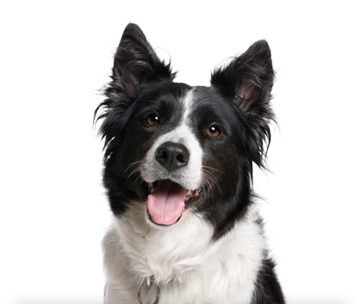With the holidays behind us and the winter doldrums in full swing, many of us are seeing an unwelcome jump on the bathroom scale. For our pets, even a pound of two of weight gain can be a real health hazard.
Studies have shown that a lean dog will live an average of 2.5 years longer than an obese dog, in part, because they are less likely to develop the medical conditions which come with excess weight. The same applies to cats.
The best way to evaluate if your pet is heavy is by performing a monthly rib check. If you can feel the ribs over the chest, with only a thin layer covering them, and if there is a slight taper to the waist when looking from the top and side, your pet is at an ideal weight. If, however, you cannot feel the ribs, and your pet’s body is becoming rounded, there could be a serious weight problem.
Also keep an eye on belly fat. A small amount is normal that occurs after spaying or neutering, but excess fat here may be the first sign that the body has too much fat – even before it covers the ribs.
If excess isn’t addressed, your pet may be in danger of developing grave health issues, including:
Arthritis – Extra weight leads to extra stress on joints and degeneration of joint surfaces, causing a pet pain and possible debilitation.
Respiratory problems – Overweight animals have difficulty breathing due to fat deposit build up in their chests, and have to use extra force to expand their ribs to get full inflation of their lungs.
Heart – In obese pets, the heart has to work extra hard to pump blood through a larger body.
Anesthetic and surgical concerns – Anesthesia is inherently suppressive to respiration; an added layer of fat around an animal’s chest can make breathing even more difficult during surgery, and can compress vessels, affecting blood flow to vital organs.
Liver disease – When a cat goes off food for any reason, body fat is mobilized to provide calories. In an obese cat, the larger amount of fat being process through the liver can cause a condition called Hepatic Lipidosis, which can eventually lead to liver failure.
To avoid these health concerns, it is best to maintain your pet’s lean body weight with an appropriate diet. If your pet is already at a point where weight loss is needed, however, there are several dietary options:
- Look for low fat, high fiber, low calorie foods
- Avoid high fat, high calorie treats (giving your dog a one-ounce cube of cheese is liking eating two hamburgers yourself!)
- Substitute with healthy treats such as melon pieces, broccoli florets, green beans, and carrots.
- Stick to portion control and meal feeding, rather than free choice feeding, which encourages snacking.
- Talk to your veterinarian for additional dietary recommendations.
Finally, as with humans, exercise is key to maintaining your pet’s health.
To kick start a fitness regimen, begin with small steps. For cats, tempt them to run up an down stairs with feathers on a stick or a laser pointer. Get your dog out for regular walks, increasing your distance gradually. Throw a ball or a Frisbee for your dog, encouraging him to play fetch.
If your schedule is too busy to accommodate your pet’s exercise plan or if you are finding it hard to go for long walks in the winter cold, consider the doggy day camp program at your local Best Friends Pet Care Center. A couple of days of active, calorie-burning play each week will get your pet’s weight under control – and keep him healthy and happy for a longer life.




